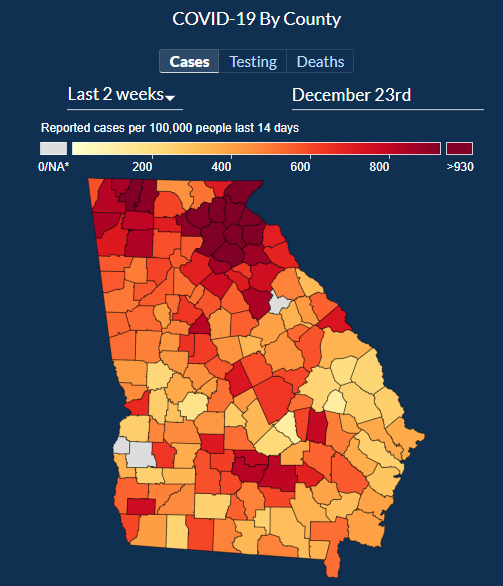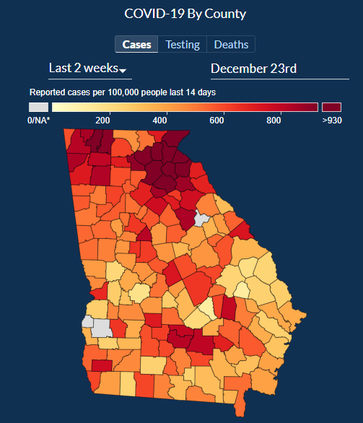The Northeast Georgia Health System is sponsoring coverage directly related to public safety so that it can be made available free to non-subscribers as a public service. News coverage is independently reported. We know that you need accurate and up-to-date information about the effects of the coronavirus in the state and our region. Please consider supporting our work by subscribing to The Times.
Officials at the Northeast Georgia Health System have made a sobering plea to the community: take precautions this holiday season or local medical facilities may have to choose who they treat.
“As the number of COVID-19 cases across the region, state and nation continue to climb, Northeast Georgia Health System leaders are asking for your help – and warning another post-holiday spike may force them to start rationing care,” a news release from the system said Wednesday, Dec. 23, referencing an ongoing rise in cases observed after the Thanksgiving holiday.
Since two days before Thanksgiving, just a month ago, cases of COVID-19 positive patients at NGHS facilities have more than doubled from 133 on Nov. 24 to 296 on Dec. 23.
Health system leaders said they’re struggling to find staff and space to care for the number of people they’re seeing come into NGHS facilities, and “frontline workers are exhausted.”
“If COVID cases continue to increase, we may be forced to start making decisions about who we can treat effectively and who we have to send elsewhere or turn away,” said Dr. Clifton Hastings, chief of medical staff for Northeast Georgia Medical Center in Gainesville. “That’s a decision no physician should have to make, and a situation no one in our community should have to face.”
On Wednesday, Dec. 23, the system saw its highest number of COVID-19-positive patients being treated at its facilities since the beginning of the pandemic in March — 296. That new peak rose above a previous one set on Dec. 19, at 279. On Christmas Eve, the number of total patients had dropped only by one. The system has, since Thanksgiving, seen several new peaks in case numbers at NGHS facilities.The average percentage of COVID-19 tests administered by the health system that come back positive has also risen sharply in the same period, from 16% to 28%, according to the NGHS release.
NGMC on Wednesday reported there were eight available beds in the hospital, and only two in the intensive care unit. The Braselton hospital reported 12 available beds and four in ICU.
NGHS is already using overflow space in a gym on the NGMC campus for less critical patients and has a mobile unit made of shipping containers
https://www.gainesvilletimes.com/news/health-care/northeast-georgia-medical-center-expected-open-20-bed-mobile-covid-19-unit-monday/
set up outside the hospital.“Early in the pandemic, we learned that limiting some services and expanding others can create additional space to care for patients – which we’ve continued to do – but we’re still faced with the challenge of maintaining enough qualified physicians and nurses to provide high-quality care,” said Dr. John Delzell, COVID-19 incident commander for NGHS. “We’re extremely thankful for the staffing support the state has supplied, and we will continue to request additional help, but hospitals across the state all need those same resources.”


NGHS received nearly 5,000 doses of Pfizer’s COVID-19 vaccine on Dec. 17 and has vaccinated approximately 2,000 frontline workers during the past week, the health system reported Thursday. The system also received around 1,500 doses of the Moderna vaccine on Thursday, Dec. 23, and more shipments are expected in early January.
“It’s important to remember that vaccination isn’t a magic bullet that will end the pandemic immediately,” said Dr. Supriya Mannepalli, NGMC’s medical director of infectious disease medicine. “People are tired of hearing this, but the best way to protect yourself, the people you love and your community this holiday season is to not visit family and friends outside your household, or take precautions if you do.”
The Georgia Department of Public Health, too, is sounding the alarms and identifying Hall County as a hotspot.
According to Wednesday data from the DPH, Hall County has seen more COVID-19 activity than any county in the state outside the metro Atlanta area.
The report shows Hall County ranks No. 4 in the state in confirmed cases per 100,000 population at 7,847; No. 5 in the state in confirmed cases at 16,193; No. 5 in the state in hospitalizations for the virus at 1,526; and No. 9 in the state in confirmed deaths at 210.
Gwinnett, Forsyth, Barrow, Habersham and others nearby appear in the top 30 in those same categories.
“It’s clear that Hall and surrounding counties have been hit especially hard during the pandemic,” said Richard Higgins, Hall County Board of Commissioners chairman. “There are a variety of factors at play, but one common factor we can all control are the personal steps we take: wear a mask, wash our hands and watch our distance.”
Kit Dunlap, president of the Greater Hall Chamber of Commerce agreed, saying the continuation of local business and school operations depend on how the community responds to and works to prevent the spread of COVID-19.
“Taking small, inconvenient steps now, like not having large holiday gatherings, will help our community avoid bigger and more difficult steps in the future – like rationing care,” Dunlap said. “Please celebrate safely.”
For holiday safety tips, vaccine information and other COVID-19 resources, visit nghs.com/COVID.

